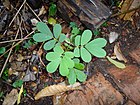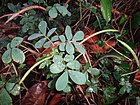Note: This is a project under development. The articles on this wiki are just being initiated and broadly incomplete. You can Help creating new pages.
Cassia tora
Cassia tora is an annual to perennial plant. It can grow up to 2 metres tall. The plant is gathered from the wild for local use as a food and medicine. It is sometimes cultivated for its seeds, which are used as a mordant.
Contents
- 1 Uses
- 2 Parts Used
- 3 Chemical Composition
- 4 Common names
- 5 Properties
- 6 Habit
- 7 Identification
- 8 List of Ayurvedic medicine in which the herb is used
- 9 Where to get the saplings
- 10 Mode of Propagation
- 11 How to plant/cultivate
- 12 Commonly seen growing in areas
- 13 Photo Gallery
- 14 References
- 15 External Links
Uses
Ringworm, Skin diseases, Vomiting, Stomachache, Skin infections, Sores, Ulcers, Insect bites, Eye complaints.
Parts Used
Chemical Composition
Common names
| Language | Common name |
|---|---|
| Kannada | Chagache |
| Hindi | |
| Malayalam | |
| Tamil | |
| Telugu | |
| Marathi | |
| Gujarathi | |
| Punjabi | |
| Kashmiri | |
| Sanskrit | |
| English | Foetid cassia, Coffee pod |
Properties
Reference: Dravya - Substance, Rasa - Taste, Guna - Qualities, Veerya - Potency, Vipaka - Post-digesion effect, Karma - Pharmacological activity, Prabhava - Therepeutics.
Dravya
Rasa
Guna
Veerya
Vipaka
Karma
Prabhava
Habit
[[:Category:Habit - |]]
Identification
Leaf
| Kind | Shape | Feature |
|---|---|---|
| Alternative pinnate | Leaflets with opposite pairs | Obovate in shape with a rounded tip, 3-3.5 cm log |
Flower
| Type | Size | Color and composition | Stamen | More information |
|---|---|---|---|---|
| Yellow | Stamens are of unequal lenth | {{{5}}} |
Fruit
| Type | Size | Mass | Appearance | Seeds | More information |
|---|---|---|---|---|---|
Other features
List of Ayurvedic medicine in which the herb is used
Where to get the saplings
Mode of Propagation
How to plant/cultivate
Plants succeed in the tropics and subtropics.[3]
Commonly seen growing in areas
Waste ground, Dry to wet thickets, Cultivated ground, Mountain slopes, River bank sands
Photo Gallery
References
- ↑ [Chemistry]
- ↑ Kappatagudda - A Repertoire of Medicianal Plants of Gadag by Yashpal Kshirasagar and Sonal Vrishni, Page No. 115
- ↑ Cultivation
External Links
- Ayurvedic Herbs known to be helpful to treat Ringworm
- Ayurvedic Herbs known to be helpful to treat Skin diseases
- Ayurvedic Herbs known to be helpful to treat Vomiting
- Ayurvedic Herbs known to be helpful to treat Stomachache
- Ayurvedic Herbs known to be helpful to treat Skin infections
- Ayurvedic Herbs known to be helpful to treat Sores
- Ayurvedic Herbs known to be helpful to treat Ulcers
- Ayurvedic Herbs known to be helpful to treat Insect bites
- Ayurvedic Herbs known to be helpful to treat Eye complaints
- Herbs with Seeds used in medicine
- Herbs with common name in Kannada
- Herbs with common name in English
- Habit -
- Index of Plants which can be propagated by Seeds
- Herbs that are commonly seen in the region of Waste ground
- Herbs that are commonly seen in the region of Dry to wet thickets
- Herbs that are commonly seen in the region of Cultivated ground
- Herbs that are commonly seen in the region of Mountain slopes
- Herbs that are commonly seen in the region of River bank sands
- Herbs
- Pages without herbs images


